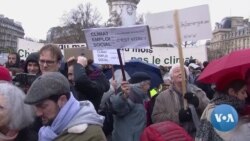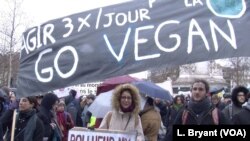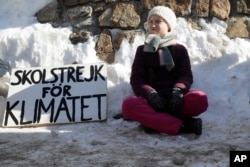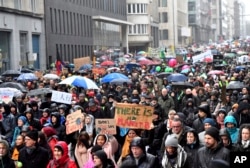Marie Toussaint has launched a climate petition in France that has attracted skyrocketing support. Ludovic Bayle splits his days between working at a restaurant and moonlighting as a climate activist. And in Sweden, Switzerland and Belgium, students are skipping school, demanding more action against what many Europeans consider one of the biggest threats to their future: climate change.
"Climate is one of the main concerns" in Europe, said Neil Makaroff, European Union policy adviser for the NGO Climate Action Network France. "Citizens are more and more mobilized today. They are taking different actions like marches, petition, litigation."
Several hundred thousand Europeans took to the streets this past week alone. Students marched in Brussels where the European Union is headquartered, and climate activists briefly occupied the Scottish parliament. At the yearly Davos gathering in Switzerland, Swedish teenage activist Greta Thunberg, who is behind the growing school strikes, told the rich and powerful they were to blame for the climate crisis. And in France, dozens of towns held climate marches last weekend, bringing young and old to the streets in sometimes pounding rain.
Climate change, some analysts believe, is also shaping up to be one of the most important issues in upcoming European parliament elections in May.
"People really, really need to wake up," said Parisian Veronique Weil, who braved whipping rain to join a climate rally at the city's iconic Place de la Republic. "The seas are rising, countries are going to disappear. ... It's crazy."
In some ways, Europe seems an unlikely place for a climate revolt. The region is considered among the world's green leaders, and the EU says it is on track to meet 2030 emissions reduction targets.
French President Emmanuel Macron has vowed to "make the planet great again," launching a "One Planet summit" — now heading for its third edition — and urging American scientists to move to France after the U.S. announced it was pulling out of the Paris climate pact.
But climate activists have criticized Macron, saying France and Europe haven't done enough. It's a message echoed by popular French environment minister Nicolas Hulot, who quit Macron's cabinet last year.
"Besides the nice sentences like 'make our planet great again,' our government is really not taking climate very seriously," said Makaroff of Climate Action Network. "Because no climate action has been really strong in France to curb emissions."
Now, citizens are taking matters into their own hands.
French environmentalist Marie Toussaint quit her government job two years ago to create a green NGO. In December, she launched a petition with three other groups, threatening to sue the French government for climate inaction. So far, the petition has gathered a record 2 million signatures, and counting.
"We really want to save the climate, to save the planet, but also to save solidarity, to save the people — to be part of the solution," Toussaint said.
The grassroots uprising is being seen in ways big and small. In the Netherlands, activists sponsoring a similar climate petition won a landmark court ruling last year, ordering the Dutch government to accelerate emissions cuts. And in Germany, the Greens Party is surging, ranked second in polls behind the ruling Christian Democrats.
In Versailles, just outside Paris, 34-year-old Ludovic Bayle spends most waking hours either waiting tables or working at his unpaid job as a member of Citizens for Climate France, one of the grassroots groups that organized last weekend's French protests. Launched in September, the chapter has nearly 70,000 members on its Facebook page.
"Of course I'm scared" about climate change, Bayle said. "That's why it's so important to act. We need to mobilize to put pressure on decision-makers."
Last weekend's climate protests intersected with another citizen's uprising in France — the yellow vest movement, in its third month. Now embracing broader demands for greater social justice, the yellow vest protests began over a fuel tax hike intended partly to fund climate measures.
As a result, some analysts suggest the yellow vests show that people ultimately are not willing to make sacrifices to curb emissions. But climate activists like Toussaint dismiss that view.
"What we see now is people who are polluting the least are being asked to pay the most," said Toussaint, who said both movements share similar demands for greater social justice.
The European parliament elections may be an early test of whether climate uprisings can translate into political power. Green parties are gaining strength, but not everywhere. In France, a recent poll placed the Greens a distant fifth in voter intentions, behind a fledging yellow vest party.
Meanwhile, the far-right National Rally Party, with a minimalist green agenda, is surging in second place, and hopes to capture votes from yellow vests, who are a highly disparate group.
Still, Makaroff believes politicians have gotten the message from the streets.
"It would be suicide for political parties not to take up climate issues in the European elections," he said.











